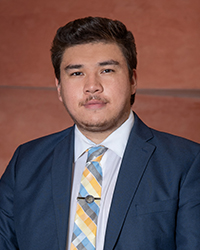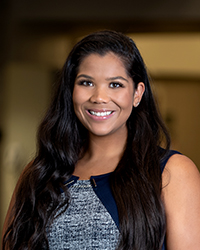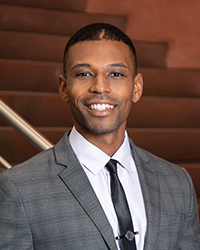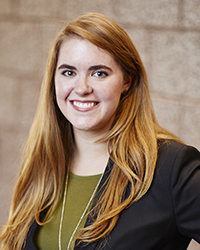Students Speak, Lawmakers Listen
Four UNLV Boyd Law students discuss the impactful bills they drafted that eventually became law during the 2021 Nevada Legislative Session
By Steve Bornfeld
In the future, they could be this state’s lawmakers. In the present, think of them as lawmakers-in-training.
That’s a status several students from the UNLV William S. Boyd School of Law earned as part of the school’s Policy and Legislation Society’s Making the Law competition. Seven competitors submitted bill draft requests that were turned into proposed bills, then presented before legislators at a mock committee hearing.
Over two days in October 2020, winners were selected by a judging panel that included several current and former Nevada Senate and Assembly members, as well as numerous UNLV Boyd Law alumni, lawyers, and activists involved in our state’s legislative process. That led to direct student involvement—and, just as importantly, impact—during the 81st (2021) session of the Nevada Legislature.
Following, in their own words, are the recollections of four of the participants.
(Editor’s note: Some comments have been edited for length and clarity.)

I knew that I wanted to compete, and I wanted my bill to address immigration reform. I called my mentor, Assemblywoman Selena Torres and we began drafting what would become Assembly Bill 376. The bill sought to codify into law that state and local enforcement agencies were prohibited from detaining immigrants longer than their hold time for purposes of transferring them to ICE [U.S. Immigration and Customs Enforcement] custody. The bill’s goal was to preserve state resources by precluding state and local enforcement agencies from participating in immigration enforcement—a task I thought should be exclusive to the federal government. The bill’s intent also was to boost confidence in our local enforcement agencies and bolster a relationship between the immigrant community and those agencies.
The competition hearing included former and current state and local lawmakers from both the Republican and Democratic parties. County Commission Chairwoman Marilyn Kirkpatrick chaired the final hearing. To say I was nervous is an understatement. What if I didn’t know the answer to one of their questions? Would the event organizers even allow an immigration-related bill to win?
The final hearing went amazing. I learned that it’s OK if a bill is missing something important. The purpose of a committee hearing is to flesh out the bill and add relevant and important ideas. That’s the reason why amendments exist.
While I had to adjust to saying “Coco Padilla, for the record” before every answer, I made it clear to committee members that I was willing to add or delete ideas. I answered questions to the best of my abilities and was transparent when I did not know an answer.
Much to my surprise, I won the competition—but the process wasn’t over. Assemblywoman Torres agreed to sponsor my bill in the 2021 session and wanted to include me in all stakeholder meetings. I sat in on meetings with the Nevada Immigrant Coalition, UNLV Boyd Law’s Immigration Clinic, and the Governor’s Office of New Americans. Just as I had predicted, the bill evolved and different components were added. While the detention component remained, it was now a small part of this all-encompassing bill.
Seeking to address the detrimental economic impacts that COVID-19 had on the immigrant community and small-business owners, the bill created a task force within the Office of the Lieutenant Governor to offer economic and social recommendations to assist immigrants. The state attorney general, in turn, would adopt model policies based on these recommendations. And that’s how the Keep Nevada Working Act came to be.
The bill was in limbo for the first half of the session until we got notice that it would be discussed before the Assembly Government Affairs Committee. The hearing was tense. While it was clear who did and did not support the bill, the real gut-wrenching moment came when we heard public testimony. It’s not easy to have your bill ridiculed or hear disparaging comments about the people you’re trying to help. But the hearing must have gone well, because committee Chairman Edgar Flores moved to have the bill voted out of committee and onto the Assembly floor. It was then reassigned to the Assembly Ways and Means Committee. The bill was not dead.
The real action came just days before “sine die” (a.k.a., the last day of the session).
The bill, which had been stuck in committee, was amended to remove the detention component and, as a replacement, appropriate $500,000 over two years to the UNLV Immigration Center for pro bono deportation defense efforts. With the new amendment, the bill was able to pass through the committee, the Assembly floor, and the Senate Finance Committee. On May 31, sine die, I anxiously waited for my bill to be considered on the Senate floor—the final step.
It’s not uncommon for a bill to reach the finish line and then die—we had not received any promises that our bill would make it out alive. But moments before the end of session, by a vote of 12-9 in the Senate, it was on its way to the governor. Once he signed it, Nevada became the first state in the country to fund deportation defense at the state level.
Having the bill signed into law was the best day of my life … sort of. By the time the ceremony was scheduled, I had already moved to New York for a summer internship. I was sad that I couldn’t make it, but Assemblywoman Torres insisted that my parents attend on my behalf. So at the ceremony, there were my parents—both U.S. immigrants—bumping shoulders with Governor Steve Sisolak, Speaker of the Assembly (and UNLV Boyd Law alum) Jason Frierson, and even Congresswoman Dina Titus (a former UNLV professor).
This competition showed me that anyone can get involved in the legislative process. I am just a first-generation college student, born and raised in Las Vegas, who saw an issue in our state laws, so I went out on a limb and tried to rectify it. And by chance, I also got my parents involved. A proud moment I’ll cherish forever.

Earlier this year, the NCAA ruled that athletes can now profit off their name, image, and likeness (NIL), and Sebastian and I felt it was important for the state to enact a law that addresses how Nevada’s collegiate athletes can do this properly, while also protecting the interests of the athletes and our universities.
Initially, we were working with former state Senator Yvanna Cancela. She was very passionate about this law, but when she resigned to take a new position with the Biden administration’s Department of Health and Human Services, we were lucky that Assembly Speaker Jason Frierson was able to pick up the bill and sponsor it.
The bill started off as a writing competition for the law school’s Policy and Legislation Society (PALS). Sebastian and I wrote a proposal, we were chosen to advance, and then COVID hit. We didn’t end up doing the mock legislative committee presentation until almost a year later. After the competition, Speaker Frierson sponsored the bill, which was introduced on the floor and then was referred to committee.
At this point, Sebastian and I presented the bill (via Zoom) with Speaker Frierson before the Assembly Committee on Education, which voted to approve it. The bill was then introduced on the Senate floor and referred to the Senate Education Committee. Sebastian and I were fortunate to be invited to Carson City, where we presented the bill alongside Speaker Frierson, and the committee approved the bill.
I have read a lot of the Nevada Revised Statutes since getting to law school, yet I still didn’t fully understand the long tactical process that a bill goes through to become law. The PALS competition offered a basic understanding, but I now have a much better grasp of the process. There’s a lot of negotiation and clarification required to convince enough members to vote in favor of a bill. I have gained so much respect for the members in our state Legislature.
This experience helped me gain a lot of confidence in my ability to work with others, negotiate, talk to legislators, and speak publicly. It also showed me that when you’re passionate about something, you can make a difference. You don’t need to be a high-ranking legislator or have key connections to make a difference. If you’re willing to work hard, do the research, practice, and have someone believe in your vision, change can happen.
As an ex-collegiate athlete, this bill was so important to me. I’m beyond thrilled I was able to do my part to make a difference for Nevada’s current and future collegiate athletes.

Assembly Bill 254, which was sponsored by Assembly Speaker Jason Frierson, enables Nevada’s NCAA student-athletes to earn money from their name, image, and likeness (NIL), while maintaining their athletic eligibility. This legislation is a step toward expanding equity for a demographic of Nevadans.
Although it’s important to understand how a bill becomes a law, the questions I asked myself along the way served as invaluable teaching points. What are issues of particular concern for stakeholders? How will this bill be perceived differently on the floor versus in a committee? What distinguishes someone as a “key player”? These are just a few questions that help procure comprehensive solutions to an issue needing to be solved.
Perhaps the most important lesson I learned during this process came in Governor Steve Sisolak’s signing of the bill: The enactment of AB 254 affirmed my belief that we can all contribute toward making our community better.
This experience also taught me that Nevada’s Legislature functions differently than politics in Washington, D.C. Although Nevada has unique challenges that can lead to partisanship, our legislators have a history of being more willing than most to reach across the aisle and work together to solve the state’s problems. The unanimous passage of AB 254 in the Senate suggests our legislative body can reach common understanding on material principles. By continuing to work cohesively on issues, the Legislature can ensure future productivity, which will help all Nevadans.
I want to express gratitude to Assemblyman Frierson for working with Karyna and me. His effort embodies the very lessons we learn at the UNLV William S. Boyd School of Law. I would be remiss without also acknowledging the herculean effort of his staff.

My bill was originally drafted to eliminate the statute of limitations for sex trafficking offenses. I am passionate about fighting sex trafficking and was shocked to see that the statute of limitations in Nevada was only four years, putting our state far behind others on this issue. It was particularly odd given that the statute of limitations for sexual assault was recently extended to 20 years, and sex trafficking includes repeated sexual assaults (in addition to other forms of abuse and exploitation).
To me, the short statute of limitations demonstrated a tragic lack of understanding about the psychological manipulation executed by sex traffickers, including brainwashing their victims into believing they’re not being exploited and intentionally forming “trauma bonds” with their victims.
I presented Assembly Bill 113 in the Policy and Legislation Society’s Making the Law competition in October 2020. Afterward, Assemblywoman Melissa Hardy—who was one of the competition’s volunteer judges—reached out about sponsoring my bill. We did more research and gathered support in the spring, and in April, she invited me to testify twice—first in committee, then before the Senate.
Every assemblyperson in the committee asked to support the bill, which then passed in the Senate. Unfortunately, by this point, the bill had been altered to merely extend the statute of limitations from four to six years. However, the support the bill received makes me optimistic that we can continue extending the statute of limitations on sex trafficking and maybe, one day, eliminate it entirely.